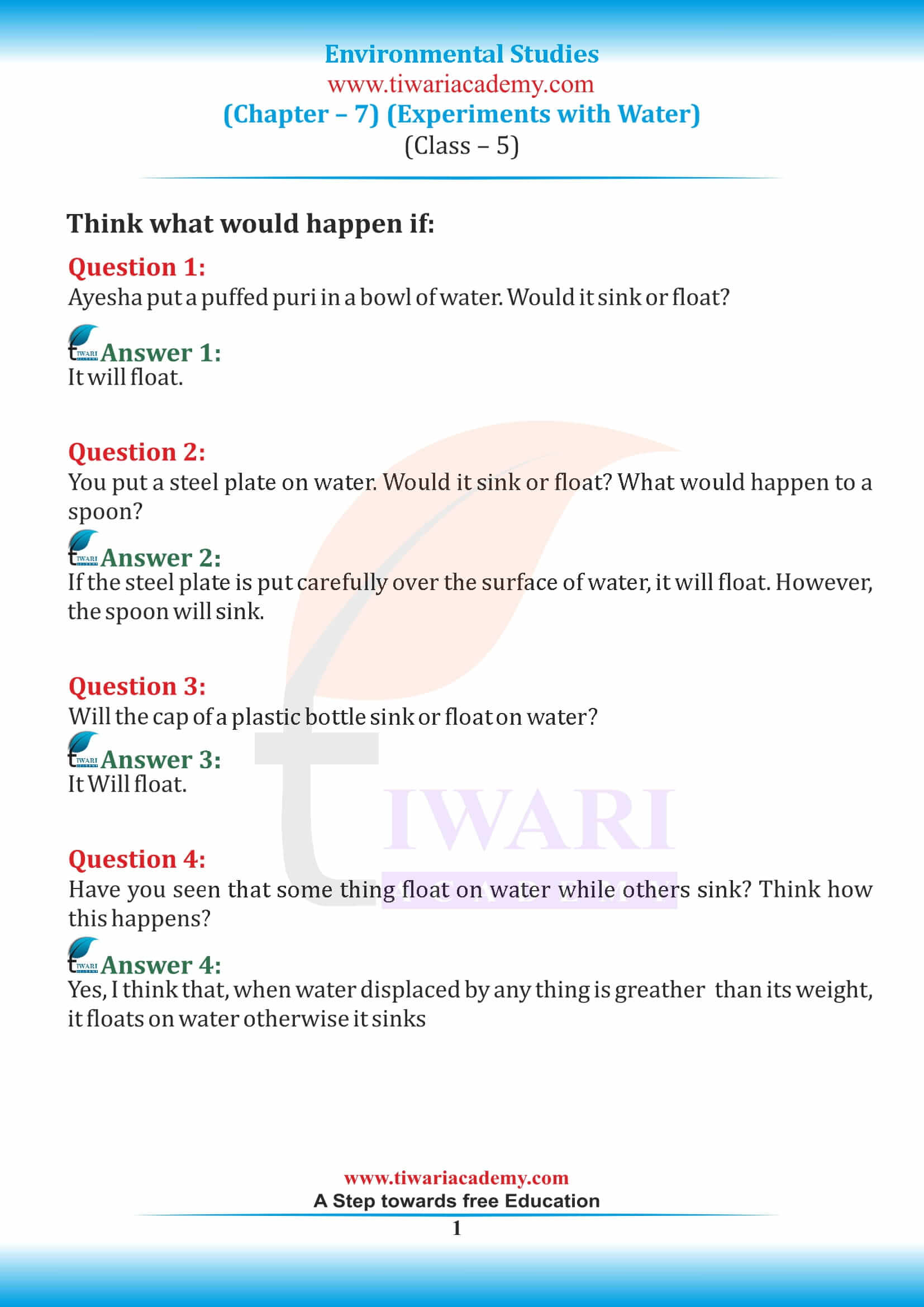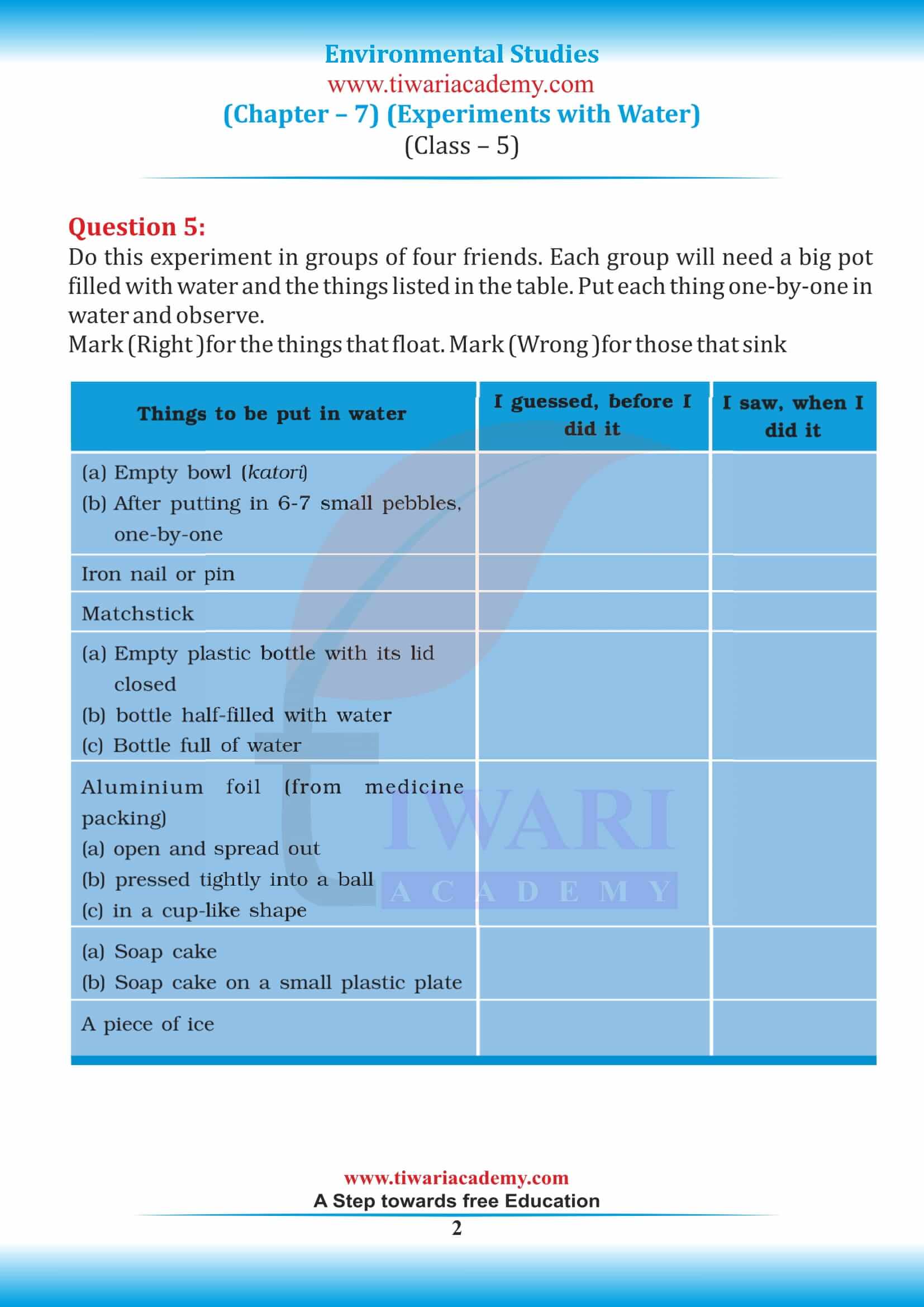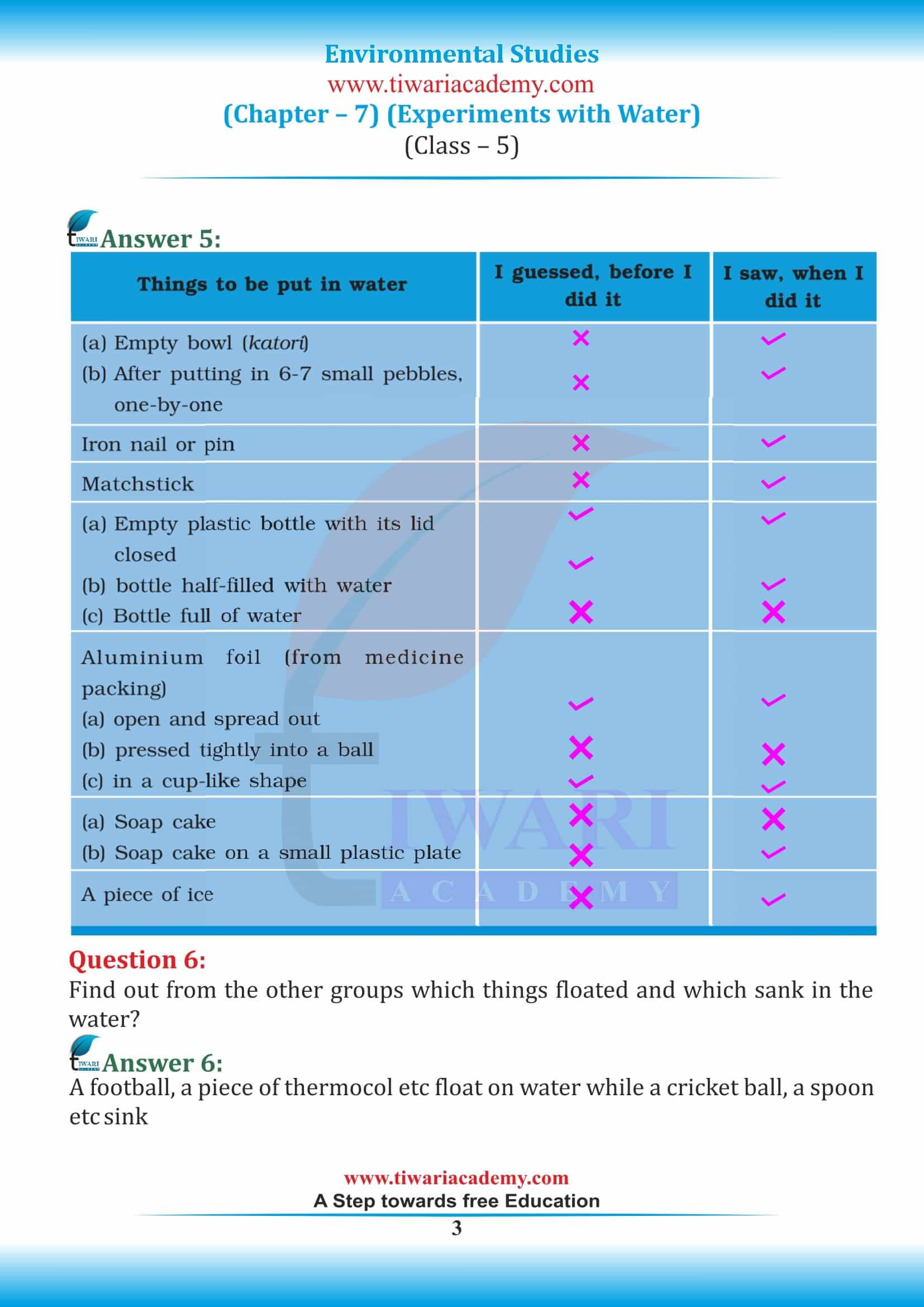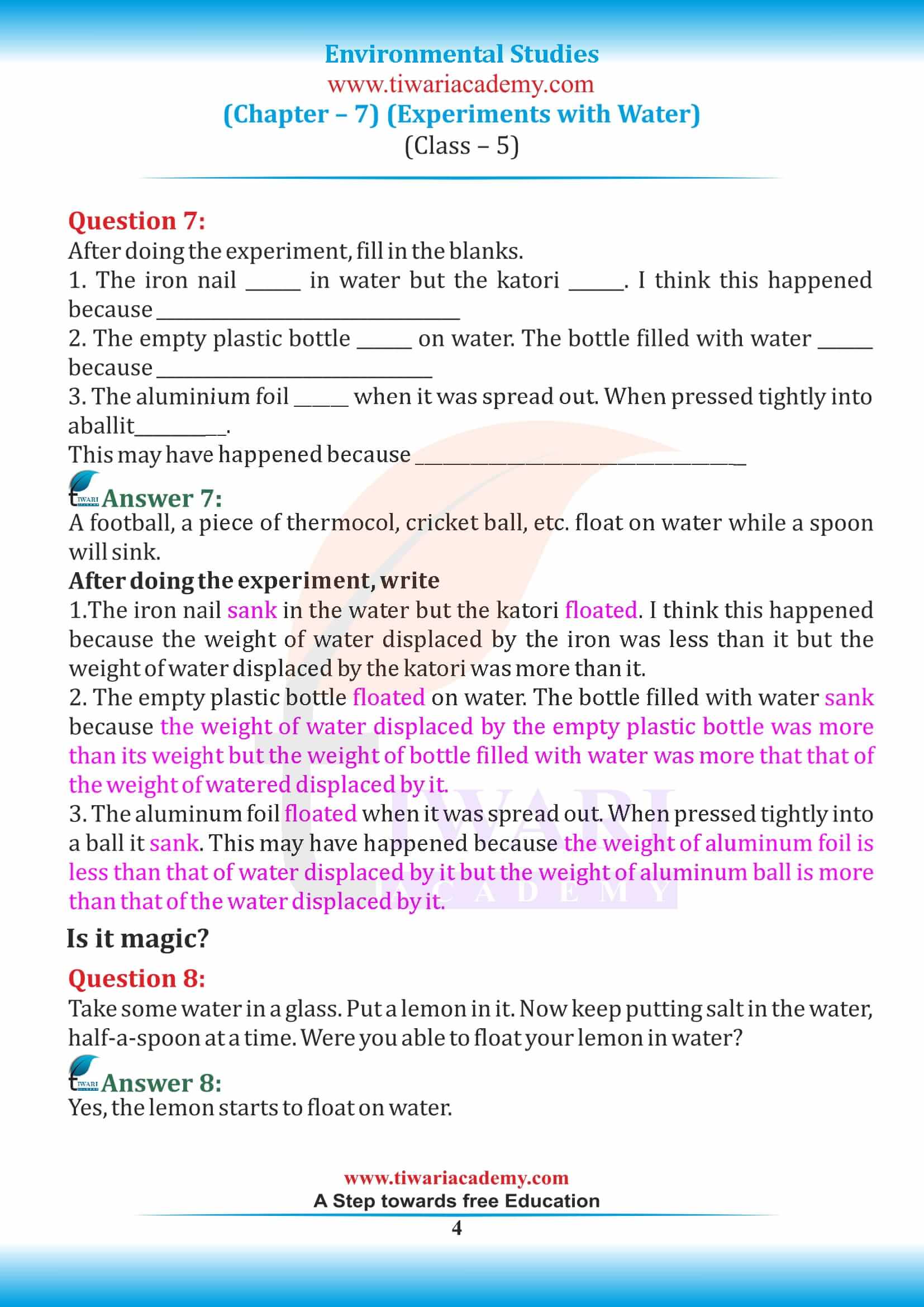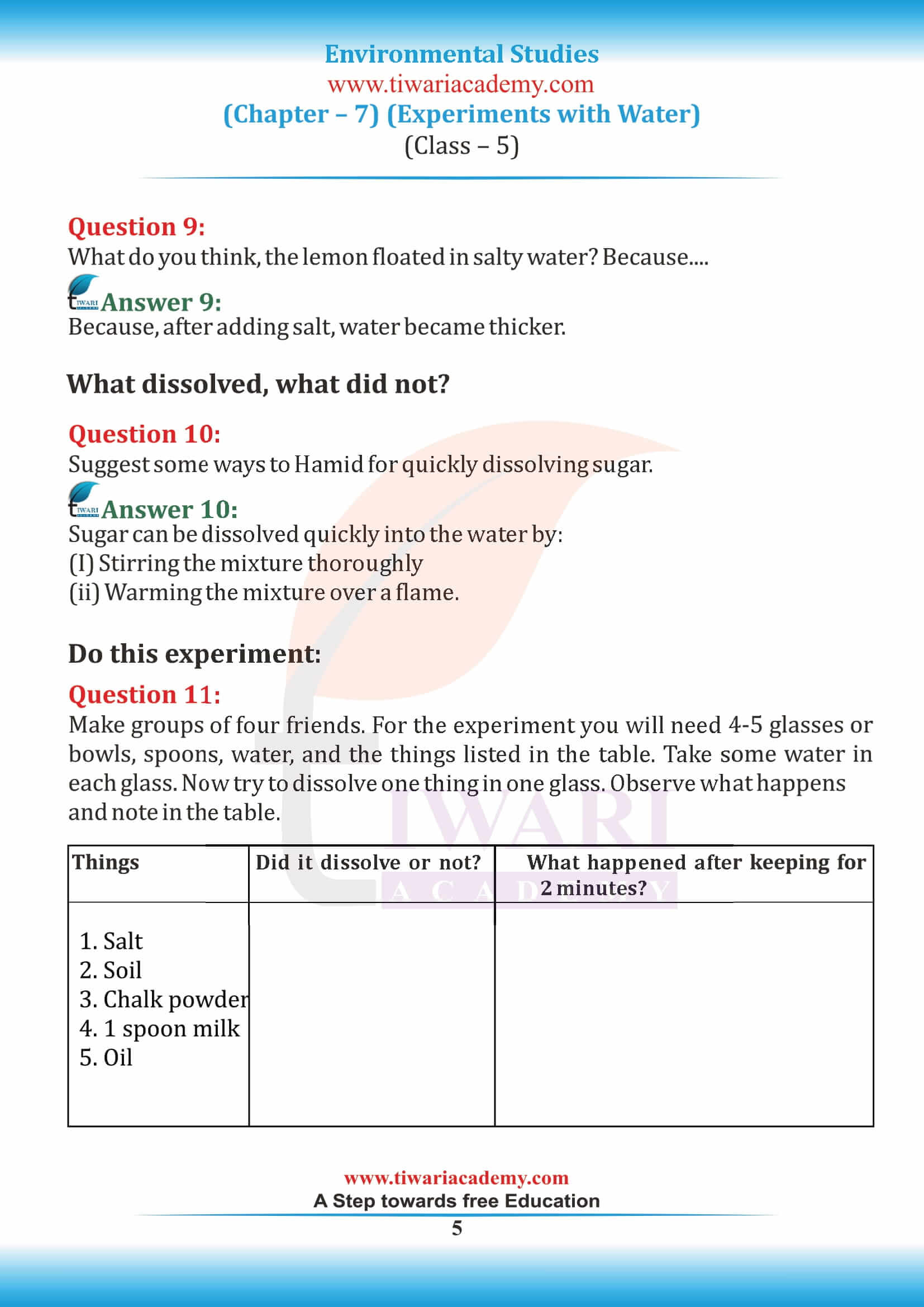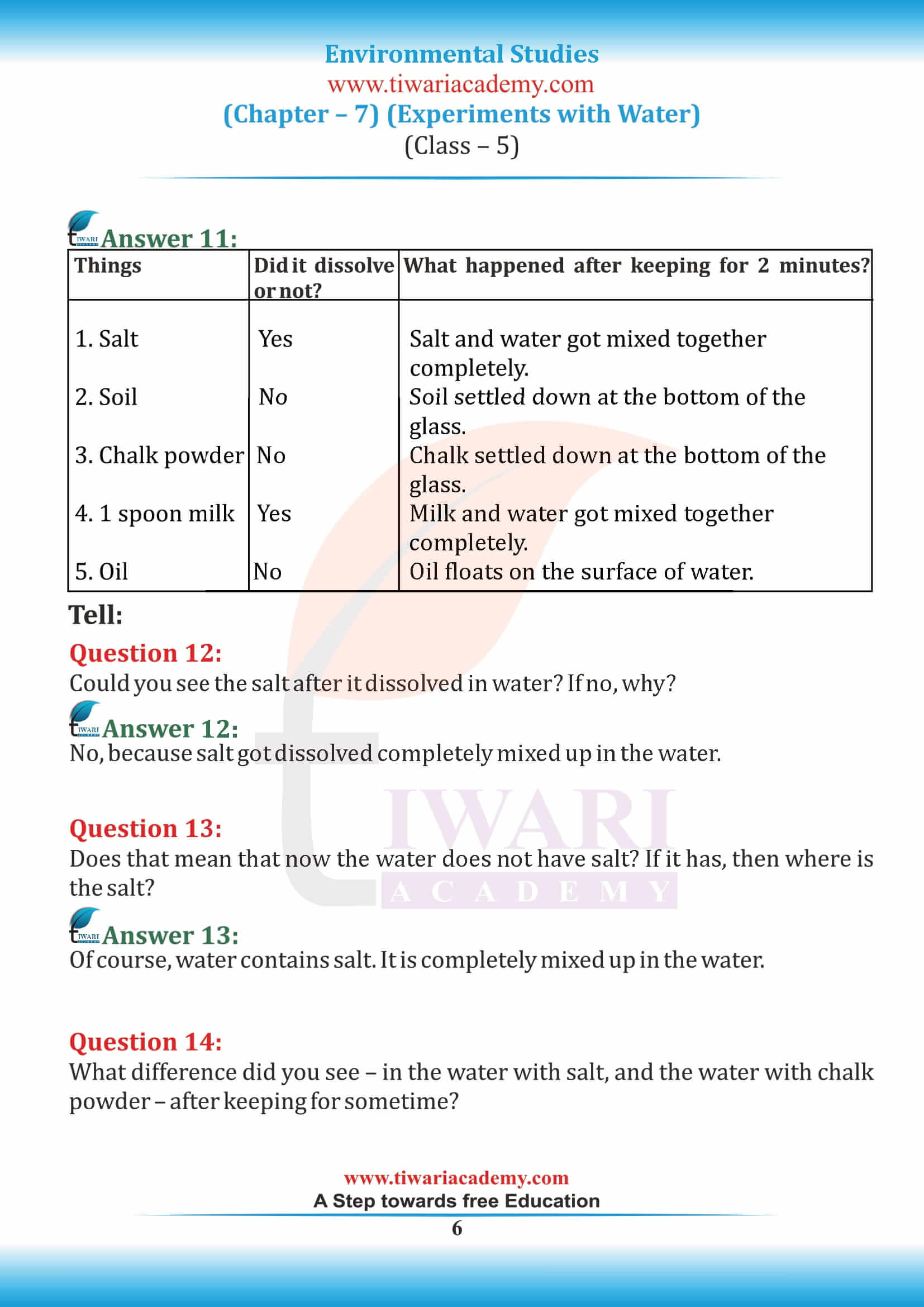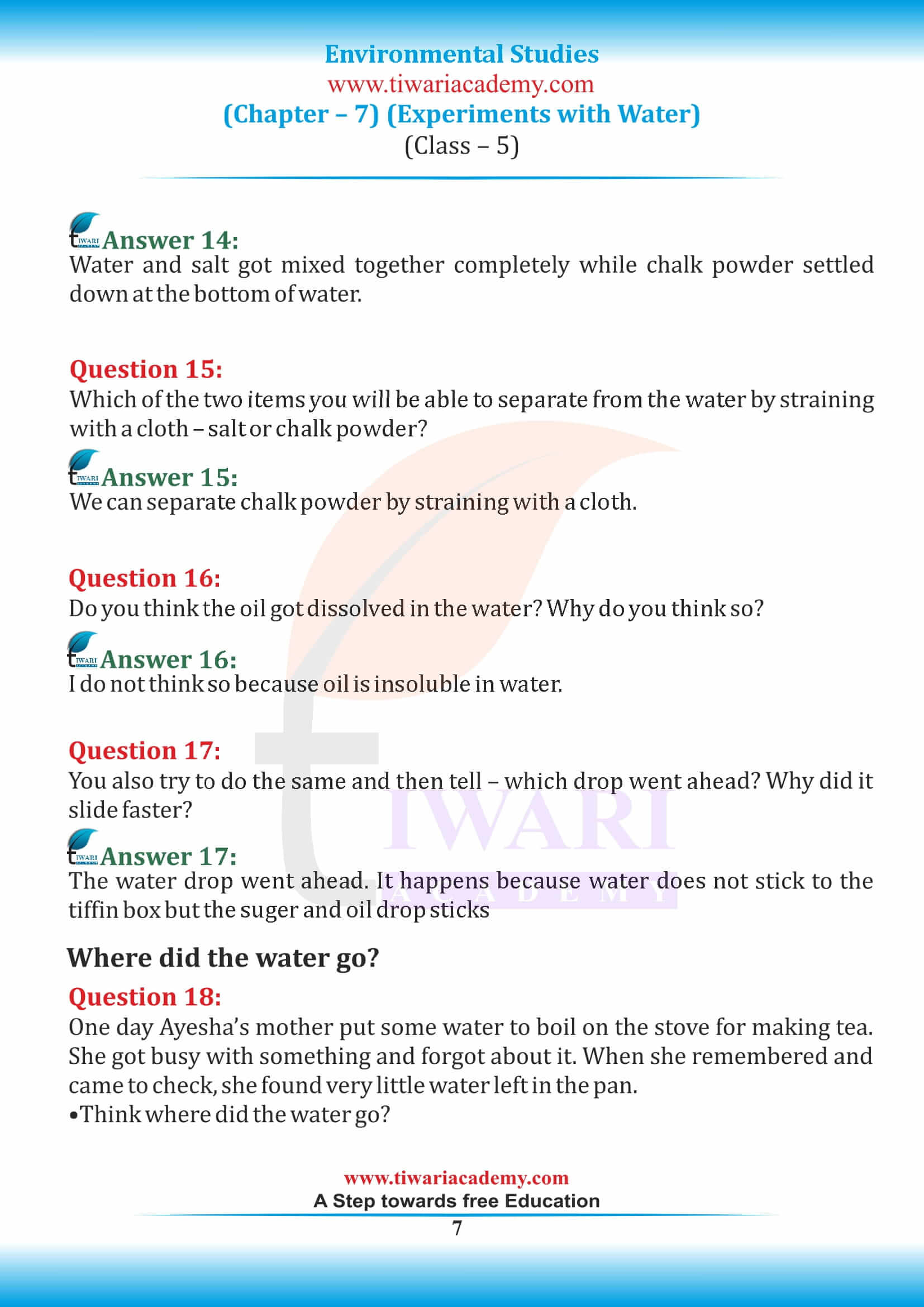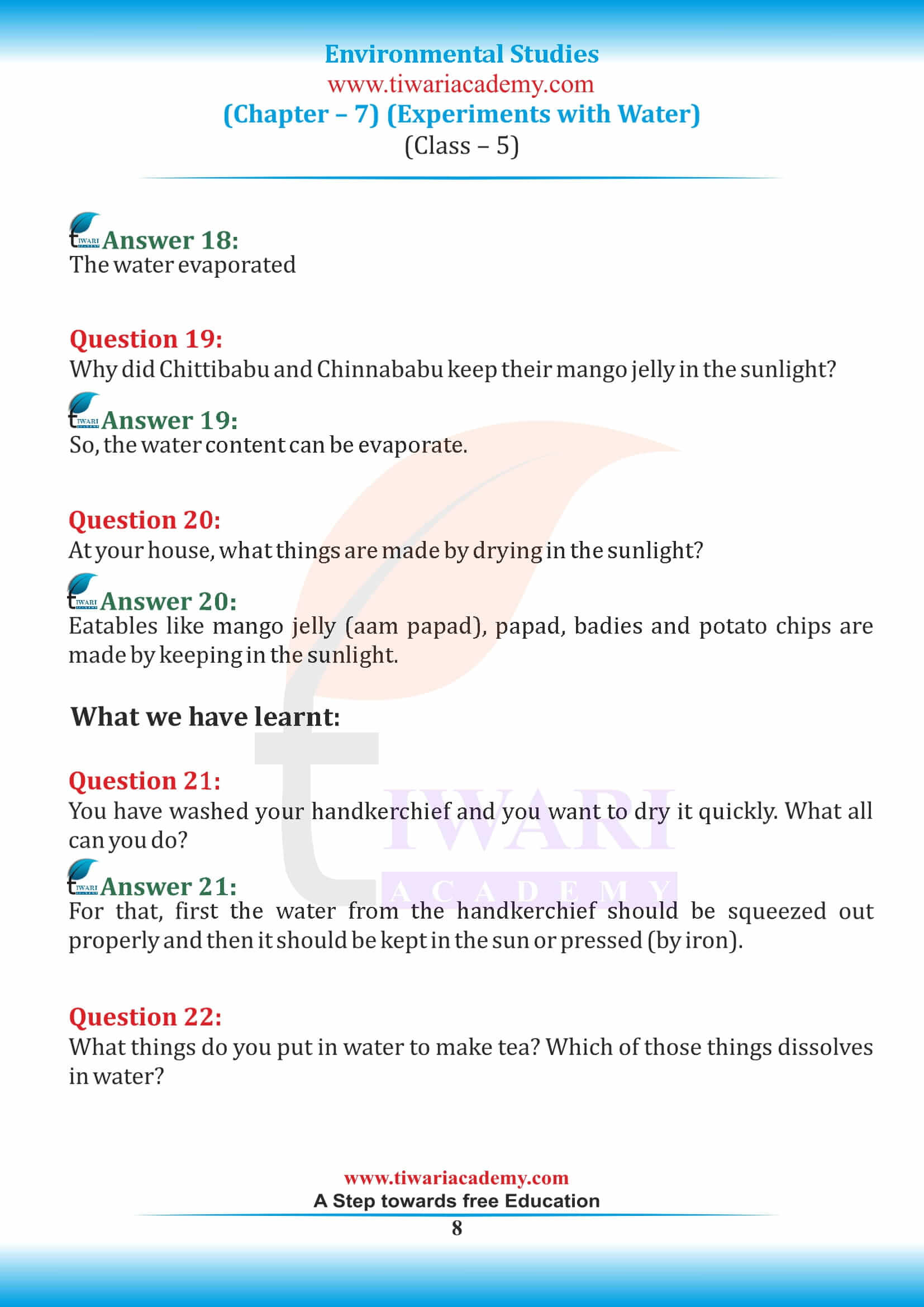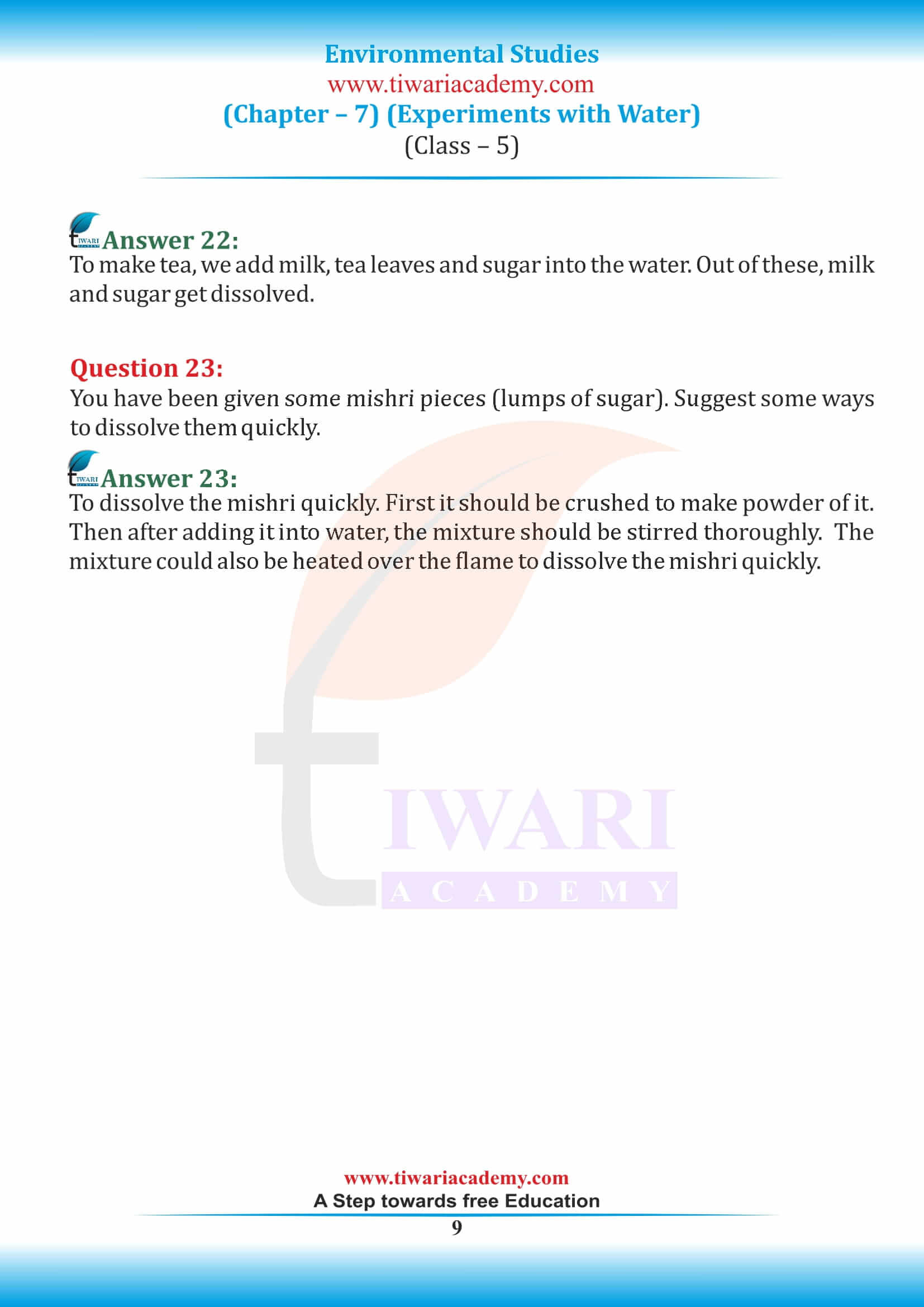NCERT Solutions for Class 5 EVS Chapter 7 in Hindi and English Medium Experiments with Water download in PDF file format to use offline the question answers for CBSE 2024-25. Class 5 EVS Chapter 7 solutions are updated for new academic session. All the questions are taken from NCERT Textbooks based on latest CBSE Syllabus. Practice Extra questions along with the NCERT Solutions to prepare for the exams.
NCERT Solutions for Class 5 EVS Chapter 7
Class 5 EVS Chapter 7 Question answers of Experiments with Water
Class 5 EVS Chapter 7 Question Answers Set 1
What did Ayesha observe when her mother was making a puri?
Ayesha watched as her mother rolled out the puri and put it in the hot oil. She saw that at first the puri sank to the bottom of the pan. As it puffed up, the puri came up and started floating on the oil.
Give reason why a puffed puri floats in oil whereas a flat puri sinks in it?
A puffed puri floats in oil whereas a flat puri sinks because puris float on oil as the hot oil makes the puri to rise up and get filled up with air. The air which is lighter than the oil makes the puris to float on oil. So,it is the hot oil that makes the puris float.
Why does a heavy ship floats whereas a needle sinks?
A heavy ship floats in water because the weight of water that is displaced by the flooded or submerged part of the ship is more than that of the ship whereas the weight of water that is displaced by the needle is more than the actual weight of the needle.
Question:
Which two factors help sugar to dissolve faster in water?
Answer:
The two factors that help sugar to dissolve faster in water are-
i. stirring the mixture well
ii. warming the mixing
Class 5 EVS Chapter 7 Question Answers Set 2
What happens to the eggs when we add salt to water while boiling them?
When we add salt to the water the density of the solution increases as salt helps in increasing the mass
without changing the volume very much. When enough salt is added to the water, the saltwater solution’s density becomes higher than the egg’s, so the egg starts floating.
Why doesn’t oil dissolve in water?
Oil does not get dissolved in water because the molecules of oil and water do not get attracted to each other.
Why is water called a ‘Universal Solvent’?
Water is called a ‘Universal Solvent’ as it can dissolve many substances in it. The water molecule gets attracted to many other different types of molecules.
When sugar gets dissolved in water, why is not visible?
When we mix sugar in water it gets dissolved in it and we can no longer see the sugar although it is still in the water because the sugar molecules get scattered and disconnected from one another.
Give some examples of objects which float and sink:
a. That can float: Wood, pencil, cork, plastic bottle (closed cap), bowl etc.
b. That can sink: needle, stone, marble, eraser etc.
Question:
What happens when we add salt to the water in which eggs are being boiled?
Answer:
When we add salt to the water in which eggs are being boiled it increases the temperature of the water for better cooking. We add salt to the water as it prevents an egg from cracking.
Class 5 EVS Chapter 7 Question Answers Set 3
What would happen to the steel plate when put on water? Why?
A steel plate would start floating on water as it is lighter than water. The size of a body does not decide whether a thing floats or sinks. It is the mass and volume of the body that collectively decide whether it will float or sink.
Will a puffed puri sink or float in water?
Puffed puri if put in a bowl of water would float as it is lighter than water. But after sometime it would start sinking due to absorption of water by the dough of puri.
Why does the ball of dough sink in water?
The ball of dough weighs more than the same amount, or volume, of water, and is denser than water, it sinks in water, no matter how big or small it is.
Question:
The iron nail sinks in water but an empty bowl floats. Why?
Answer:
This happened because
(i) the weight of water displaced by the iron nail is less than its own weight
(ii) the weight of water displaced by an empty bowl is equal to its own weight.
Class 5 EVS Chapter 7 Question Answers Set 4
Why does a soap cake sinks in a bucket of water whereas a soap case floats in water?
The soap cake sinks in water and the soap case floats because the soap cake is solid and doesn’t have any empty spaces to be able to float in water whereas soap case has empty space in which soap settles. The empty space of the soap case gets filled with air which is less dense than water and helps the case to float.
What is evaporation?
Evaporation is a process in which the liquid turns into a gas. When water gets heat energy it changes to a gas. An increase in temperature speeds up the rate of evaporation. Water evaporates when it is boiled.
Why does a nail made of iron sinks but a ship made of iron floats?
An iron nail sinks in water but a ship made of iron floats because of the density of the iron nail and the ship. The iron ship has larger surface than an iron nail and has spaces that get filled with air. Because of this the density of the ship is less as compared to water.
The ship is hollow from inside and this space is filled with air which reduces the average density of the ship lower than that of water. Thus, even with a small portion of the ship submerged under water, the weight of the water displaced by it becomes equal to the weight of the entire ship.
Question:
Why do you think the lemon floats in salty water?
Answer:
The lemon floats in water having excess salt because water gets heavier when salt is added in excess amount. And lemon which is lighter in weight will float on heavier water. When salt is added to water, the water gets heavy. So, the lemon that is lighter floats on salt water that is heavier.
Question:
Why does an object float or sink when placed on the surface of water?
Answer:
An object float or sink when placed on the surface of the water because-
- An object sinks in water if its density is greater than that of water.
- An object floats in water if its density is less than that of water.
- Density thus plays an important role and so some things float and some sink.
- Objects that are denser than water sink and those less dense than water float.
Class 5 EVS Chapter 7 Question Answers Set 5
Why does a handkerchief dry quickly in sun?
The handkerchief that is kept in the sun will dry at a faster rate than the one kept in shade as the heat from the sun evaporates the water molecules from the handkerchief leaving it dry. Warm water evaporates much faster than cool water. So, the heat from the sun dries the handkerchief quickly.
Why is the Dead sea called so?
The Dead Sea is almost nine times as salty as the ocean. That makes it impossible for most life to exist in it. This is the reason it is called dead sea.
What happens to chalk powder when dissolved in water?
When we dissolve chalk powder in water it does not mix in it rather it settles down at the bottom of water and some particles spread throughout the water.
Why does water slide faster than oil?
Since water is denser than oil it has a lesser volume than oil. Water therefore has a higher amount of inter molecular force of attraction.
But as oil is stickier than water and has a higher amount of inter molecular force of attraction than water. That is why water slides faster than oil.
What happens to the aluminium foil when it is spread out in water?
Aluminium foil when spread it is spread out floats in water because the weight of aluminium foil is less than that of water displaced by it.
What happens to pressed aluminium foil in water?
When aluminium foil is pressed tightly into a ball it sinks because of the weight of aluminium ball is more than that of the water displaced by it.
Question:
Why are life jackets used by swimmers?
Answer:
An object floats in liquid if the weight of the object is equal to weight of the liquid displaced by it. So, the person in swimming pool has some weight and in order to make the person float, life jackets are worn. Life jackets are made to keep a person afloat in water to prevent the risk of drowning.
The air trapped in the life jacket weighs much less than the weight of the water it displaces, so the water pushes up harder while the life jacket pushes down, allowing the life jacket to float. That is why it is used by the swimmers.
Question:
Why do people don’t drown in dead sea?
Answer:
In dense and salty water, a little body is able to displace a lot of mass, and as a result most of the body stays out of the water so, it’s difficult for a person to drown when most of their body is floating on top of the water. The Dead Sea water has a density of 1.24 kg/litre, which lets a person float.
Class 5 EVS Chapter 7 Question Answers Set 6
What happens to oil when mixed in water?
The oil is less dense than the water. This is because the molecules of oil are larger than the molecules of water, so oil particles take up more space. As a result, the oil will rise to the top of the water. The water molecules attract each other, and the oil molecules stick together so it causes oil and water to form two separate layers. Thus, leaving oil sitting on top of the water when mixed in it.
How can we separate salt from water?
Water can be separated from salt by a process called distillation. In this method water has a much lower boiling point than salt. When the solution is heated, the water evaporates. It is then cooled and condensed into another container. Thus, it is separated from water.
How can we separate chalk powder from water?
Chalk is insoluble in water and forms a heterogeneous mixture when mixed with water. As chalk is heavier, therefore it will settle at the bottom of the mixture when it is left undisturbed for some time. Thus, water can be separated from chalk powder by sedimentation, decantation and filtration
Why did Gandhiji undertake Dandi march?
Mahatma Gandhi and his followers left from the Sabarmati Ashram on March 12, 1930, to protest against the British salt law as per which the Indians were not allowed to make salt. This is called the Dandi March. The British had a control over the production of salt and collected a heavy salt tax.
How is salt made?
Salt production is done by capturing the salt water in shallow ponds where the sun evaporates most of the water. The method of making salt from sea water includes the process evaporation is used on a large scale to obtain common salt from sea water. Sea water is then trapped in shallow lakes and allowed to stand there. The heat of sun evaporates water in the shallow lakes and common salt is left behind.
Question:
Define: i. volume ii. Mass iii. Density
Answer:
(i) Volume: The volume of an object is a measure of the amount of space occupied by that object.
(ii) Mass: is a measure of the amount of matter in an object.
(iii) Density: Density is that measurement that compares the amount of matter an object has to its volume. An object with more matter in a certain volume has high density. An object with little matter in the same amount of volume has a low density.
Class 5 EVS Chapter 7 Question Answers Set 7
What is displacement?
Displacement means that an object has been moved, or has been displaced. Displacement is defined to be the change in position of an object.
Why do clothes take more time to dry on a cloudy day?
On a cloudy day, the air is full of water vapour. As the air gets warmer, its capacity to hold water vapour increases. And the condition becomes more and more humid. So, wet clothes take more time to dry on a cloudy day. Atmosphere has moisture in it so the clothes need high temperature so the water in the clothes can evaporate and on a rainy day the temperature is low. Wet clothes take longer time to dry on a rainy day because evaporation of water does not take place in clothes.
Name the substances that do not dissolve in water.
Many substances do not dissolve in water example- oil, paraffin wax and sand, chalk powder, ghee, oil, stone, wood.
Name few things which dissolve in water.
Things like salt, sugar and coffee, milk, mud, lemon juice dissolve in water. They are soluble and dissolve faster in warm or hot water.
How can we dissolve mishri in water?
To dissolve the mishri in water. We need to crush it to make powder of it. Then we have to add it into water and stir it thoroughly. It can also be heated over the flame to dissolve the mishri quickly.
Question:
What happens to water when we add milk in it?
Answer:
When we add water in milk it dissolves in it form a homogeneous substance.
How important is the chapter7 from NCERT EVS of class 5 with the perspective of knowledge?
The chapter is fairly important as the chapter makes you think about the logic about the nature of various things like how some of the things are floating and some don’t. There is and a scientific reason for that and the force is called buoyant force and that they will learn in higher class but the chapter will for sure raise the curiosity to learn about this thing.
Why do you think the saltwater made the egg float in chapter 7 of the 5th standard EVS?
The best reason we can share is that the saltwater makes the water heavy and that is why the eggs will float and the actual logic behind the reaction the children have to study in the book and discuss it with the friends and teacher.
As per the various experiments given in chapter 6 of 5th class EVS, what do you suggest more fun, and is there another suggestion that you want to give?
There are indeed different experiments given in the chapter but for me, I live the most about the experiment with the eggs to see if they float. Apart from this I have tried to make the paper boat and tried to float it and I used different types of papers to see which one floats for the longest time. Try to do it yourself and find out why they all sink in the end but float for different duration.
